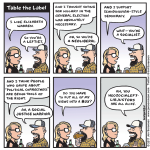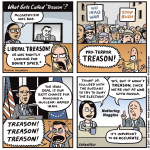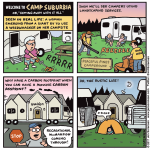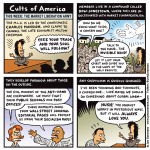The Sorensen Monologues
Archive for July, 2017
Table the Label
Lately I’ve been feeling like progressives have become so entrenched in their own conceptual frameworks that we’re splitting hairs and engaging in name-calling instead of constructively addressing the big picture. This is not to say we can’t disagree; but the abuse of the confusing term “neoliberal” is not helping, considering very few liberals actually subscribe to market fundamentalism. And it’s complicated: Austerity, for example, is a neoliberal economic approach that was (thankfully) not embraced by the Obama administration. It should go without saying that the term “neoliberal” has nothing to do with political “liberalism” – but sadly it does seem to need saying.
On a similar note, I use the term “socialist” in this cartoon because I see it thrown around a lot, but Scandinavian countries don’t actually have socialist economies; “social democracy” is a more accurate way to describe those governments.
This earlier blog post has more thoughts on how we’re prone to labeling ourselves in unhelpful ways.
What Gets Called “Treason”?
The Constitution has a very narrow definition of treason — but conservatives only seem to notice when they are denying something anyone would normally call treason.
One of the supreme ironies of this whole Russia scandal goes back to Ann Coulter’s 2003 book Treason: Liberal Treachery from the Cold War to the War on Terrorism. A primary thesis of that screed is that Joseph McCarthy was unfairly maligned by nefarious liberals (Joe Conason has more on why Coulter’s revisionist narrative and worship of McCarthy is absurd). So here we have one of the bestselling books of 21st-century conservatism, proclaiming that liberals who were falsely accused of treason by an out-of-control demagogue are themselves treasonous for merely daring to point this out. Fast-forward to 2017, when Coulter seems strangely unconcerned by the Trump family’s coziness with Russia, a repressive authoritarian state that kills journalists, quashes dissent, and is actively engaged in a plan to destabilize America and Western Europe.
Camp Suburbia
I don’t mean to insult people who live in campers out of necessity — it probably does make a certain amount of financial sense in some of today’s real estate markets — or eco-campers utilizing solar power and generally trying to be quiet and responsible. What I’m talking about is the phenomenon I’ve observed in my own recent travels, of oversize diesel pickups hauling enormous RVs hauling all manner of “toys” — motorcycles and 4-wheelers and dune buggies; of gargantuan RVs that literally look like tractor trailers; of people using, yes, weed whackers and obnoxiously loud generators that are the aural equivalent of a hammer to the head for hours on end. Back in the ’90s and early 2000s, we used to make fun of SUVs for being road hogs. Remember when Hummers seemed excessive? Now everything is getting bigger and louder and more disgusting, and no one even seems to notice anymore. The fact that Americans seem more oblivious than ever to this stuff, at this moment of climate crisis, with ice shelves collapsing and coral reefs experiencing a mass die-off, is astounding.
The Cult of Market Fundamentalism
A “classic” for the Fourth of July. While Trump doesn’t follow the dogma exactly when it comes to free trade (for better or worse, probably worse), he and most Republicans in Congress do seem to be true believers in this peculiar form of witchcraft (no disrespect intended to Wiccan readers).
The first step of confronting the problem is to name it. “Market fundamentalism,” a term I picked up from George Lakoff, should be a buzzphrase on the tips of everyone’s lips. It has become THE defining force — paired with racism — of Americans’ economic lives. Pundits and Democratic politicians should be throwing this concept around, ridiculing it like the joke it is. Instead, we’re fixated on the right-wing term “political correctness,” which blinds us to the real problems facing America. Swap these two out and you change the playing field.




